Within the framework of the 8th Session of the 15th National Assembly , on the morning of November 9, Minister of Education and Training Nguyen Kim Son, authorized by the Prime Minister, presented to the National Assembly a summary of the draft Law on Teachers.
The Law on Teachers aims to develop the teaching staff.
The draft Law on Teachers presented by Minister Nguyen Kim Son stated: The 2013 Constitution (Article 61) affirmed that " Education development is the top national policy to improve people's knowledge, develop human resources, and nurture talents".
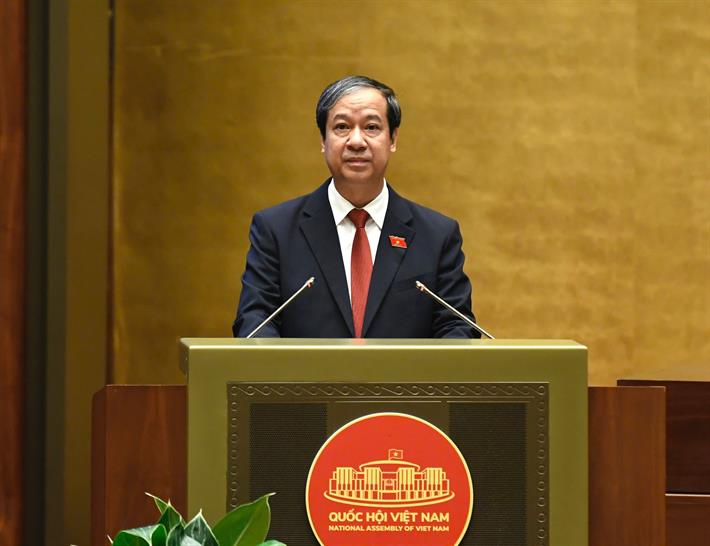 |
Minister Nguyen Kim Son presented a summary of the draft Law on Teachers at the National Assembly.
Resolution 29-NQ/TW dated November 14, 2013 of the Central Executive Committee on fundamental and comprehensive innovation of education and training, meeting the requirements of industrialization and modernization in the conditions of a socialist-oriented market economy and international integration has set the task of "developing a team of teachers and management staff, meeting the requirements of innovation in education and training". In particular, the Party's policy is to "have preferential treatment for teachers and education management staff", and "teachers' salaries are given the highest priority in the administrative salary scale system and have additional allowances depending on the nature of the work, by region".
Conclusion 91-KL/TW dated August 12, 2024 of the Politburo on continuing to implement Resolution No. 29-NQ/TW affirmed the need to "Focus on reviewing, amending, supplementing, and perfecting mechanisms, policies, and laws on education and training, removing bottlenecks" and set out the requirement of "the need to soon develop a Law on Teachers".
Thoroughly grasping the Party's guiding viewpoints and the need to promptly institutionalize those guiding viewpoints, the Ministry of Education and Training determined that advising the Government to develop and submit to the National Assembly the Law on Teachers is an important institutional solution aiming at the goal of developing the teaching staff, building a teaching force with sufficient quantity, ensuring structure and quality, capable of shouldering the glorious mission assigned by the Party, State and people.
The draft Law on Teachers submitted to the National Assembly this time has a basic structure and content including 5 major policies, expressed in 09 chapters, 50 articles, regulating the following basic contents:
Chapter I. General provisions includes 06 Articles (from Article 1 to Article 6) regulating the scope of regulation; applicable subjects; identification of teachers; role of teachers; explanation of terms; principles of management and development of teachers; state policies on building and developing the teaching staff.
Chapter II. Professional activities, rights and obligations of teachers includes 05 Articles (from Article 7 to Article 11) regulating the professional activities of teachers, rights of teachers, obligations of teachers, ethics of teachers and things that must not be done.
Chapter III. Titles and professional standards of teachers includes 04 Articles (from Article 12 to Article 15), regulating the titles of teachers; professional standards of teachers, and the use of professional standards of teachers.
Chapter IV. Recruitment and use of teachers includes 11 Articles (from Article 16 to Article 26), regulating the recruitment of teachers, acceptance of teachers in public educational institutions, internship or probationary regime, contracts for teachers, working regime of teachers, mobilization, secondment, transfer, teachers teaching inter-school and inter-level in public educational institutions, appointment of teachers to hold management positions of educational institutions, and evaluation of teachers.
Chapter V. Salary and benefits policy for teachers includes 05 Articles (from Article 27 to Article 31), regulating salaries and allowances for teachers, policies to support and attract teachers, retirement regime and retirement at older ages for teachers in public educational institutions.
Chapter VI. Training, fostering and international cooperation on teachers includes 02 Sections, 07 Articles (from Article 32 to Article 38) regulating training, fostering teachers and international cooperation on teachers.
Chapter VII. Honoring, rewarding and handling violations includes 07 Articles (from Article 39 to Article 45) regulating Vietnam Teachers' Day, conferring the titles of People's Teacher, Meritorious Teacher, conferring the titles of Honorary Doctor, Honorary Professor, rewarding teachers, rewarding agencies, organizations and individuals who have made many contributions to the building and development of the teaching staff, disciplining teachers, temporarily suspending teaching and handling violations of acts that infringe upon the prestige, honor, rights and legitimate interests of teachers.
Chapter VIII. Teacher management includes 02 Articles (Article 46, Article 47) regulating state management of teachers, responsibilities of educational institutions in teacher management and inspection and examination of teachers.
Chapter IX. Implementation provisions include 03 Articles (from Article 48 to Article 50) regulating the amendment, supplementation and abolition of a number of provisions of a number of relevant laws, their effective date and transitional provisions.
Some new points on policies for teachers in the draft Law
Pointing out some new points on policies for teachers in the draft Law, Minister Nguyen Kim Son said: Compared with current regulations in related Laws, the Law on Teachers has many new points, including the following highlights:
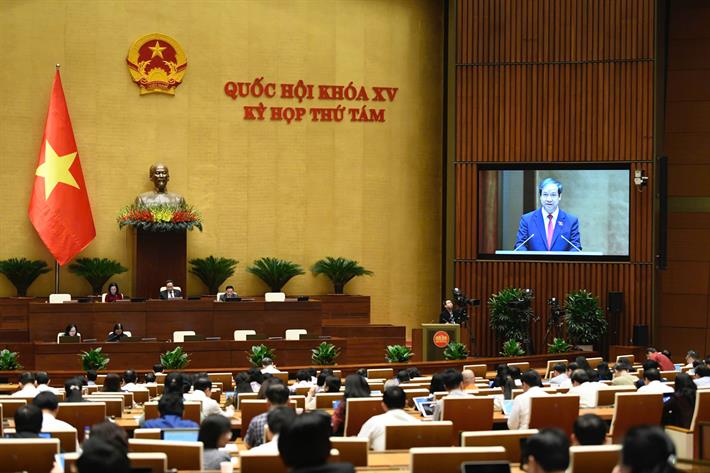 |
Scene of the National Assembly session on the morning of November 9
1. The Law on Teachers was built with a new perspective on the management and development of the teaching force. That is the perspective of shifting from management mainly by administrative tools to management by expertise and quality management tools; from personnel management to human resource management, aiming at comprehensive development of the teaching force, to be consistent with the profound and comprehensive innovation in education, from the education management system to school management that has been and is being implemented. This is a new point in the approach, applied consistently in the process of building the law and reflected in each content.
2. The subjects and scope of application of the Law on Teachers are teachers in educational institutions in the national education system, including teachers in public educational institutions and teachers in non-public educational institutions. For the first time, there is a legal basis for teachers in non-public educational institutions to be equal to teachers in public educational institutions in terms of identification, professional standards, basic rights and obligations of teachers and a number of policies such as training, fostering, honoring, rewarding, and handling of violations.
3. For the first time, the rights and obligations of teachers are clearly, completely and systematically defined. Teachers are required to constantly develop and are protected through the rights of teachers and what individuals/organizations are not allowed to do to teachers in the direction of increasing the initiative, creativity and protection of teachers in professional activities.
4. Standardize and improve the quality of the teaching staff through a system of titles and professional standards for teachers with standards according to the requirements of professional capacity associated with each level of education and training.
5. Regulations on pedagogical practice requirements in teacher recruitment aim to select people with sufficient capacity in line with teacher professional standards, meeting the professional activities of teachers at each level of education and training level. Policies on mobilization, secondment, transfer, inter-school and inter-level teaching for teachers in public educational institutions are stipulated in the law as a basis for arranging and assigning teachers in accordance with the characteristics of professional activities and the practical requirements of the education sector.
6. The education sector has a more proactive role in recruiting, using and managing teachers. In particular, the Ministry of Education and Training and the Ministry of Labor, War Invalids and Social Affairs are the agencies in charge of developing strategies, projects, development plans, and total staffing levels for teachers under their management authority to submit to competent authorities for decision; coordinating the staffing levels of teachers in public educational institutions according to the number assigned by competent authorities; education management agencies or educational institutions play a leading role in recruiting, using and managing teachers and implementing according to the principle of promoting decentralization and delegation of power to localities.
7. Teachers' salary policy is prioritized. In particular, the basic salary according to the teacher salary table is ranked highest in the administrative career salary scale system; teachers are entitled to preferential allowances and other allowances depending on the nature of the job, according to the region according to the provisions of law. Teachers continue to receive seniority allowances until the salary policy according to Resolution 27-NQ/TW is implemented. Preschool teachers; teachers working in particularly difficult areas in ethnic minority areas, mountainous areas, coastal areas and islands; teachers of specialized schools; teachers implementing inclusive education; teachers who are ethnic minorities and teachers in some specific professions are given priority in the salary and allowance regime compared to other teachers. Teachers recruited and assigned salaries for the first time are assigned a salary increase of 01 level in the administrative career salary scale system.
8. Teachers working in ethnic minority areas, mountainous areas, border areas, islands and areas with especially difficult socio-economic conditions; teachers teaching specialized schools, teachers teaching inclusive education; teachers teaching ethnic minority languages; teachers teaching Vietnamese language enhancement for ethnic minority students; teachers teaching gifted subjects and arts are entitled to a number of other support policies (such as ensuring official housing, being paid for travel expenses during working time in areas with especially difficult socio-economic conditions during annual leave, holidays, Tet...).
9. The State has policies to attract highly qualified people, talented people, excellent graduates, young scientists, and people with special gifts to participate in recruitment as teachers; teachers to work in especially difficult areas such as ethnic minority areas, mountainous areas, coastal areas, and islands.
10. The retirement age of teachers is regulated separately according to the characteristics of their professional activities. In particular, teachers in preschool education institutions, if they wish, can retire at a lower age but not more than 05 years older than the regulation and will not have their pension rate deducted due to early retirement. Teachers with the title of professor, associate professor or doctoral degree and teachers working in specific specialized fields and sectors can retire at a higher age if needed.
After Minister of Education and Training Nguyen Kim Son presented a summary of the draft Law on Teachers, Chairman of the National Assembly's Committee on Culture and Education Nguyen Dac Vinh presented a report on the review of the draft Law on Teachers.
On the afternoon of November 9, the National Assembly discussed in groups about this Law Project.
According to the plan, on November 20, the National Assembly will discuss the draft Law on Teachers in the hall. After that, the Minister of Education and Training will explain and clarify a number of issues raised by National Assembly deputies.
Source: https://moet.gov.vn/tintuc/Pages/tin-tong-hop.aspx?ItemID=9984


![[Photo] Prime Minister Pham Minh Chinh receives the delegation of the Semiconductor Manufacturing International (SEMI)](https://vphoto.vietnam.vn/thumb/1200x675/vietnam/resource/IMAGE/2025/11/06/1762434628831_dsc-0219-jpg.webp)


![[Photo] Closing of the 14th Conference of the 13th Party Central Committee](https://vphoto.vietnam.vn/thumb/1200x675/vietnam/resource/IMAGE/2025/11/06/1762404919012_a1-bnd-5975-5183-jpg.webp)














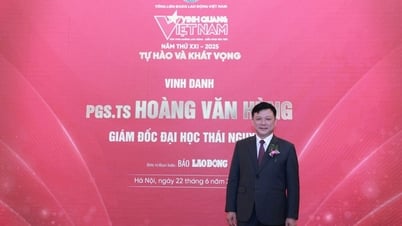
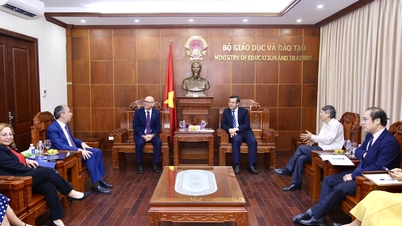
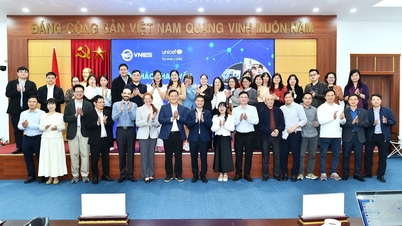
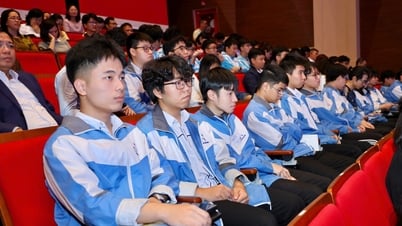








































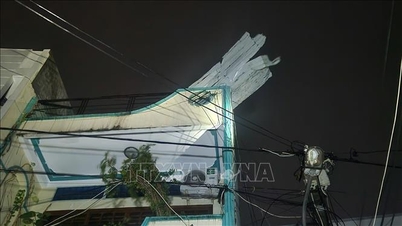

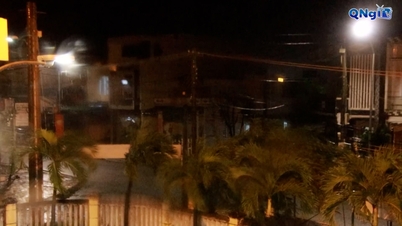



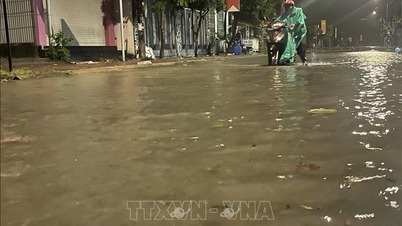








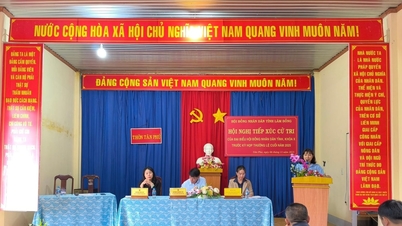

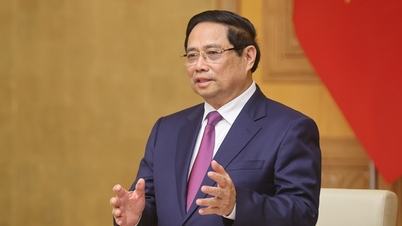


















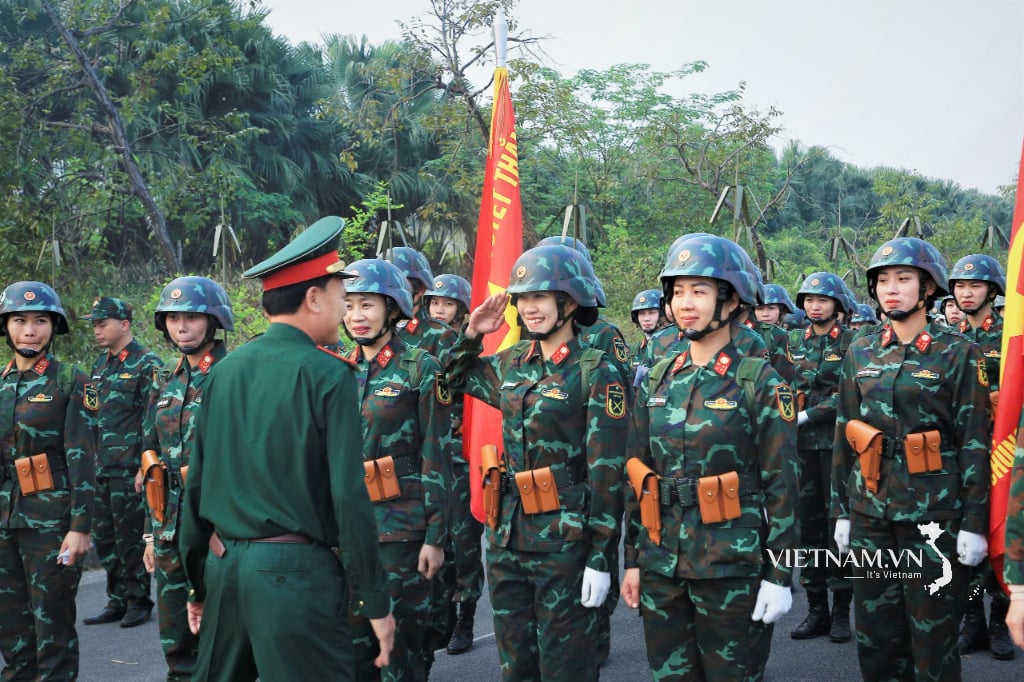
Comment (0)